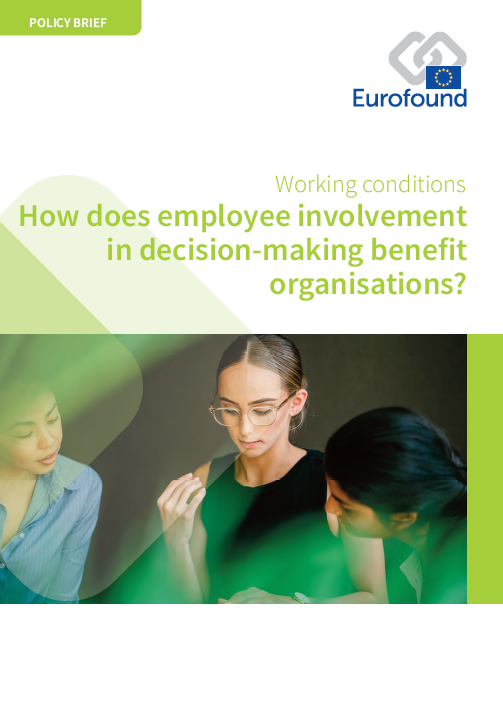
¿Cómo logran las organizaciones sacar el máximo partido de sus empleados? Los estudios sobre la gestión de los recursos humanos han concluido que una práctica clave es la participación de los empleados: dejar que estos tomen decisiones sobre su propio trabajo y contribuyan a la toma de decisiones en materia de organización. Un alto grado de participación de los trabajadores genera entornos de trabajo muy motivadores que favorecen el desarrollo de competencias. Este es el tipo de entorno de trabajo que las organizaciones necesitan para satisfacer las demandas de innovación y capacidad de adaptación al cambio tecnológico en una economía basada en el conocimiento. El presente resumen de políticas analiza las pruebas que sostienen que los lugares de trabajo donde los empleados cuentan con un elevado nivel de participación logran mejores resultados en términos del desarrollo de la capacidad de los trabajadores para lograr un elevado rendimiento que los lugares de trabajo con un bajo nivel de participación. Analiza la influencia de la organización del trabajo en dos factores que contribuyen al rendimiento: el compromiso laboral y el desarrollo de competencias.
Key findings
In total, 29% of employees in the EU, Norway and the United Kingdom work in forms of work organisation that provide a high level of employee involvement – meaning that employees are able to exercise their own initiative in carrying out tasks and have substantial input, either individually or collectively, in decisions that affect the wider organisation.
Nearly half of employees (47%) working in a high-involvement organisation report a high level of work engagement, almost double the share working in low-involvement organisations (24%). Highly engaged employees demonstrate a more positive orientation towards their work. They are less often absent from work, more likely to put in extra effort, prefer a later retirement age, and report higher levels of well-being.
High-involvement organisation provides more opportunity for both formal and informal skill development, but it is particularly strongly associated with informal skill development. This finding implies that high involvement is most likely to promote the practical expertise that underpins innovative thinking and to increase the capacity of organisations to adapt to changing technological and market environments.
High-involvement organisation has a levelling effect with respect to skill development. Differences in opportunities for skill development between high-skilled and lower-skilled employees are lower in high-involvement organisations.
These findings together suggest that it is particularly important to raise the decision-making latitude of less-skilled workers if employers are to optimise the performance of their workforce as a whole.
Graphs
- Figure 1: Types of work organisation and the proportion of employees who work in each, EU, Norway and the UK, 2015
- Figure 2: Percentage of employees in high- and low-involvement organisations, EU, Norway and the UK, 2015
- Figure 3: Levels of work intensity reported by employees in four organisation types (%)
- Figure 4: Levels of managerial fairness and supportiveness reported by employees in four organisation types (%)
- Figure 5: Levels of work engagement reported by employees in four organisation types (%)
- Figure 6: Effect of high involvement on work engagement by occupational category
- Figure 7: Employee scores on formal and informal skill development indices, by sector
- Figure 8: Employee scores on formal and informal skill development indices, by organisation type
- Figure 9: Factors accounting for occupational differences in informal skill development
- Number of pages
-
24
- Reference nº
-
EF19006
- ISBN
-
978-92-897-2083-0
- Catalogue nº
-
TJ-AR-20-003-ES-N
- DOI
-
10.2806/697286
- Permalink
Cite this publication
Eurofound (2020), ¿De qué modo beneficia a las organizaciones que los empleados participen en la toma de decisiones?, serie Encuesta europea sobre las condiciones de trabajo 2015, Oficina de Publicaciones de la Unión Europea, Luxemburgo.
